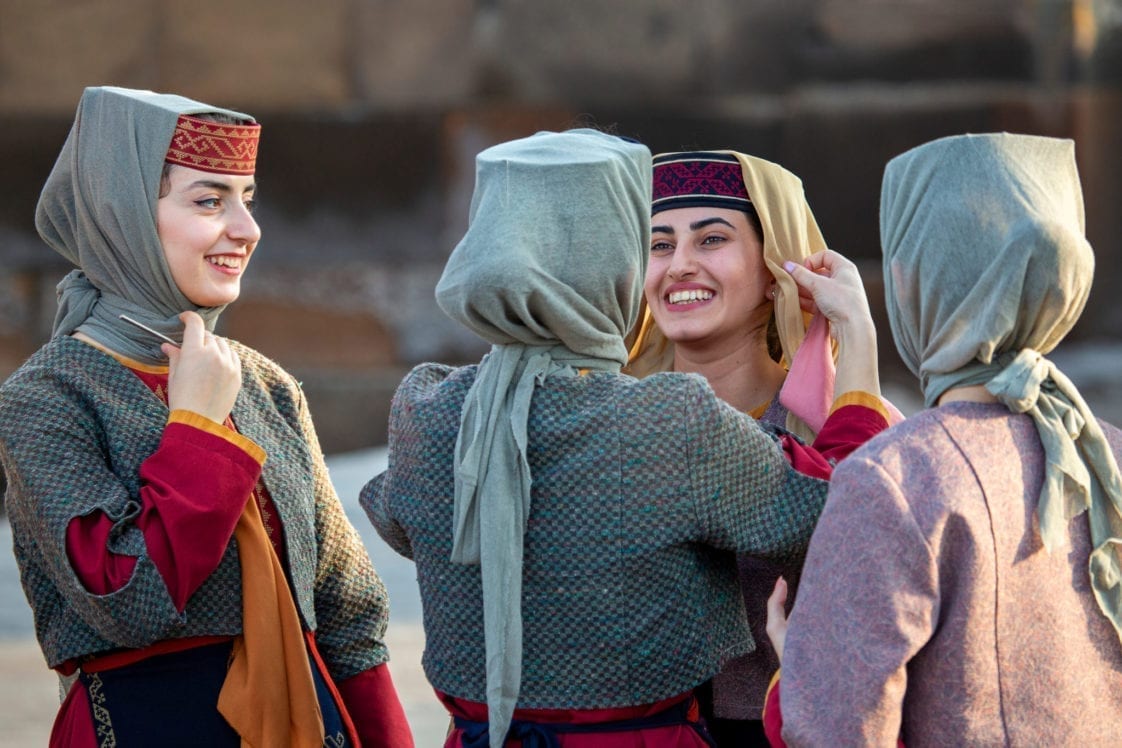Artsakh, also known as Nagorno-Karabakh, is a mountainous region that has been inhabited by Armenians for thousands of years. Its people have been fighting for reunification with Armenia for nearly a century, after it was split by Stalin and the USSR. Today the region has been violently annexed by Azerbaijan, a corrupt and anti-democratic regime. We support the right of self-determination for the people of Artsakh.
Armenian for more than 2700 years
Artsakh has been continuously inhabited by Armenians since the 7th century BC. Despite being surrounded by the rise and fall of neighboring empires, Artsakh has always been distinguished by its determination to belong to the Armenian people. Artsakh and Armenia have been one entity throughout the Romans, Persians, Ottomans, and others.
In the last century, Soviet control of the Caucus region resulted in a dramatic reshaping of Armenia’s borders. Artsakh was separated from Armenia and placed under Azerbaijani administration by the USSR, a move that was violently resisted at the time, and is still in dispute to this day.
With the fall of the USSR in the early 90’s, violent conflicts over control of the region resulted in liberation of Artsakh. Azerbaijan recognized Nagorno-Karabakh as a third party in the war and they started direct negotiations with the Karabakh authorities. With some exceptions, a cease-fire held from 1994 until 2020 between Armenia, Azerbaijan, and a self-governing Artsakh.
Free from the USSR and with new-found wealth in oil and gas, Azerbaijan engaged in a massive campaign of bribery and illegal influence of European leaders, known as the “Azerbaijani Laundromat”, where they attempted to whitewash their grave human rights violations, and to purchase support for their claims over Karabakh. They also invested billions of dollars into modernizing their military, largely with Turkish weaponry.
In September 2020, in coordination with Turkey’s military leaders and with Syrian mercenaries, Azerbaijan launched an offensive against Artsakh. International bodies accused Azerbaijan of engaging in war crimes, including targeting civilian and torturing prisoners. Azerbaijan’s military superiority resulted in rapid advancement, and much of Artsakh was annexed. A ceasefire was reached about six weeks later, brokered by Russia and Turkey. The terms included the deployment of Russian peacekeepers, and Azeri control of major areas.
The future of the region is uncertain. What is painfully clear, however, is the Azeri destruction of cultural heritage sites such as Jugha, continued human rights abuses, dangerous propaganda, and incitement of ethnic hate crimes. The Armenians of Artsakh who had been living in an independent democracy are now subject to suffer under an autocratic regime with one of the worst human rights records in the world.
Our Actions
The Switzerland-Armenia Association provides historical, legal and cultural evidence which makes it easy to understand the indisputable truth that this territory belongs to the Armenian people. We also lobby the Swiss government to recognize the rights of Armenians who are attempting to exercise the shared Swiss values of liberty, democracy, and self-determination.
Records & Links
Swiss Parliamentary interventions
R1044 Geneva Passes Motion Demanding That Azerbaijan Release Armenian Political Prisoners
GRAND CONSEIL de la République et canton de Genève
4295 INTERPELLATION: Protection of the population in Nagorno Karabakh
STREIFF-FELLER MARIANNE
4650 INTERPELLATION: Financing of the Nagorno-Karabakh war from Switzerland
MÜLLER-ALTERMATT STEFAN
4464 POSTULATE: War in Nagorno-Karabakh. Shed light on the role of Socar in financing the war
SOMMARUGA CARLO
5948 QUESTION TIME: SOCAR – A hub for war financing in Switzerland?
MÜLLER-ALTERMATT STEFAN
5949 QUESTION TIME: Right to life of the Armenians in Nagorno-Karabakh
MÜLLER-ALTERMATT STEFAN
6104 QUESTION TIME: Refugees from the war in Nagorno-Karabakh – Swiss humanitarian aid
RYTZ REGULA
6110 QUESTION TIME: Exchange of prisoners and urgent recovery of bodies in connection with the Nagorno-Karabakh war
ARSLAN SIBEL
4643 INTERPELLATION: Implications of the Nagorno-Karabakh War
MÜLLER-ALTERMATT STEFAN
4519 INTERPELLATION: Protection of historical monuments in Nagorno-Karabakh
MORET ISABELLE
International Politics
Historical, legal and cultural framework
Ethnic cleansing of Nagorno Karabagh Armenians: a modern genocide
Sarkis Shahinian
PRELIMINARY OPINION on the situation in Nagorno-Karabakh and on the need for the international community to adopt measures to prevent atrocity crimes [PDF]
Juan Ernesto Mendez
Expert Opinion Genocide against Armenians in 2023 [PDF]
Luis Moreno Ocampo
Nagorno-Karabach Legal Aspects [PDF]
Shahen Avakian
Nagorno-Karabakh and the principle of self-determination under international law [PDF]
Philipp Egger
International legal foundations for the independence of the Republic of Artsakh / Nagorno Karabakh
Prof. Dr. Otto Luchterhandt
Armenia’s defeat in the 3rd Karabakh War. Causes and consequences [PDF]
Dr. Otto Luchterhandt
15 Questions And Answers Concerning The Karabakh Conflict
Accountability for Destruction of Cultural Heritage: The case of Jugha [PDF]
Intervention of SAA at the Human Rights Council (05/2013)
Armenia / Azerbaijan: right of peoples to self-determination over territorial integrity?
Dr. Alfred de Zayas
Geopolitical assessment of the conflict in Nagorno-Karabakh: the great game of powers
Pierre-Emmanuel Thomann
The Armenians of Karabakh in danger: a cure, self-determination
(an opinion article signed by several Swiss politicians)
Heavy suspicions of war crimes in Nagorno-Karabakh
Wikipedia: Armenophobia and Anti-Armenian sentiment
Wikipedia: First Nagorno-Karabakh War
Videos and Media
RSI Radio On Azerbaijan Hosting COP29: Human Rights Violations, Ethnic Cleansing and More
Interview with Radio Kontrafunk, from min. 38′ until ca. 50’)(GE, audio)
Armenia, Azerbaijan and Russia sign Nagorno-Karabakh peace deal (EN, video)
Nagorno-Karabakh War Explained (video)
Video by the Armenian Professional Society
Legal basis for Nagorno-Karabakh self-determination (FR, video)
Peace in Nagorno-Karabakh? (FR, audio)
Nagorno-Karabakh, another coin in the Russian-Turkish game? (FR, audio)
Repositories of Documents & Reports
Lemkin Institute Summary Artsakh Report
Reports of the Human Rights Defender of the Republic of Artsakh
Reports of the Human Rights Defender of the Republic of Armenia
Permanent Representation of the Republic of Artsakh in France
Deutsch-Armenische Gesellschaft
Deutsch-Armenische Gesellschaft: Document Repository
Parliamentary Group Swiss-Armenia Reports & Briefings
Nagorno-Karabakh – Aspects of geopolitics, international law, and human rights [PDF]
PARLIAMENTARY GROUP SWISS-ARMENIA
The Destruction of Jugha and Armenian Cultural Heritage in Nakhijevan [PDF]
PARLIAMENTARY GROUP SWISS-ARMENIA
